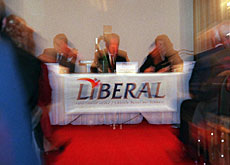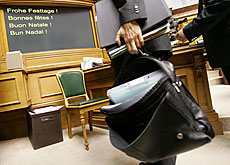Party funding is shrouded in mystery

Switzerland is one of the few Western countries which has not adopted legislation on the funding of political parties.
However, debate on the subject has recently been reignited, after a newspaper published a list of donations made to one party by a number of Swiss firms.
Which firms give money to political parties, how much do they give and which parties benefit?
In Switzerland, answers to these questions are almost impossible to obtain.
At federal level, political parties are not obliged to account for their income, although there is a law – introduced very recently – requiring that politicians declare interests in commercial companies or other organisations.
No party has ever tried to conceal the fact that it receives donations from the private sector – and indeed such donations are legal.
However, until recently, the sums of money involved and the names of the companies concerned have never been disclosed.
The Lausanne daily “24 Heures” recently made an attempt to fill the gap by publishing the accounts, for the years 2001 to 2003, of the Swiss Liberal Party, a small party on the centre-right of the political spectrum.
The figures show that in 2003, for example, the country’s largest bank UBS donated SFr100,000 ($76, 587) to it, the food multinational Nestlé SFr40,000, Credit Suisse SFr20,000, the Swiss Cigarette Manufacturers’ Association SFr10,000, and others, making for a total of SFr265,090.
Rising costs
Party president, Claude Ruey, freely admits that his party receives funding from big businesses.
“Though to a lesser extent than the larger parties,” he explained to the newspaper.
Until a few years ago, the issue of party funding was less controversial in Switzerland than in other Western countries.
“Traditionally in our country, it has always been possible to conduct an election campaign without spending a large amount of money. Since the financial outlay is relatively small, the danger of misconduct is also less acute,” explains Tiziano Balmelli, a constitutional law expert who wrote his doctoral thesis at Fribourg University on the subject of party funding.
“However, in the last couple of parliamentary elections here in Switzerland, there has been a change, with more money being spent on campaigning,” he added.
This is a situation that could well hinder the proper functioning of the country’s democratic system.
On the one hand, there is the problem of equal opportunities: parties which find it easier to raise funds may be able to exercise greater influence over the voters.
On the other, donor companies might put pressure on the parties they support.
Moves in parliament
This gap in Swiss legislation was recently criticised by Transparency International (TI), a non-governmental organisation, which combats corruption in public life.
TI pointed the finger at the Swiss system of party funding recently, describing it as “one of the most opaque in Europe”.
Moreover, the issue is soon to be raised again in parliament. The Social Democratic Party has announced that it intends to file legal amendments.
“We are calling for state funding of political parties, at least in part, to cover some of the public-interest functions they perform, such as research, the translation of documents and training, on condition that the parties are transparent regarding their sources of income,” explains party spokeswoman Claudine Godat.
Utopian notion
For Balmelli, transparency is undoubtedly a fundamental aspect of democracy.
However, as a goal, it is difficult to achieve, as the experience of many other countries demonstrates.
“Even with very detailed rules on transparency, abuses have still taken place. We saw this in Germany, with Helmut Kohl’s slush funds. As I see it, the idea that total transparency can be achieved is an illusion.”
And achieving it by means of state funding is probably an even more utopian notion.
In the 1970s, many countries introduced state funding as a way of solving the problem, but the effects have been counterproductive.
“It began with very modest sums involved, but then the amount of money rocketed. At the same time, there was an increase in the phenomenon of secret funding, since, with the amount of public funding equal for each party, this was the most obvious way of gaining an advantage,” explains Balmelli.
In Balmelli’s view, it would be far more effective to put a cap on expenditure. This would at least ensure equality of opportunity.
“Limits of this kind would be easy to verify. Advertisements in newspapers and posters are clearly visible. It is very difficult to cheat on that kind of expenditure.
“This solution would go straight to the root of the problem: when a candidate knows he cannot spend an excessive amount, he has little incentive to go looking for it,” Balmelli points out.
swissinfo, Daniele Mariani
In France, Germany and Italy, political parties are obliged to declare the names of the private individuals and companies, which donate money to them.
In Italy, this applies to sums of more than €50,000 (prior to the approval of a recent law, the figure was €6,614).
In France, there is a ceiling on donations of €4,600.
Radical Party: annual budget SFr 3 million, of which 65% is covered by donations from businesses.
Christian Democratic Party: SFr2 million, 50%.
Swiss People’s Party: SFr2 million, 35%.
Social Democratic Party: SFr2.5 million, of which 70% is covered by members’ contributions. Only one private company makes donations to this party.
Apart from the Social Democrats, none of the other parties in government reveals the names of its corporate donors.
Translated from Italian

In compliance with the JTI standards
More: SWI swissinfo.ch certified by the Journalism Trust Initiative




You can find an overview of ongoing debates with our journalists here. Please join us!
If you want to start a conversation about a topic raised in this article or want to report factual errors, email us at english@swissinfo.ch.